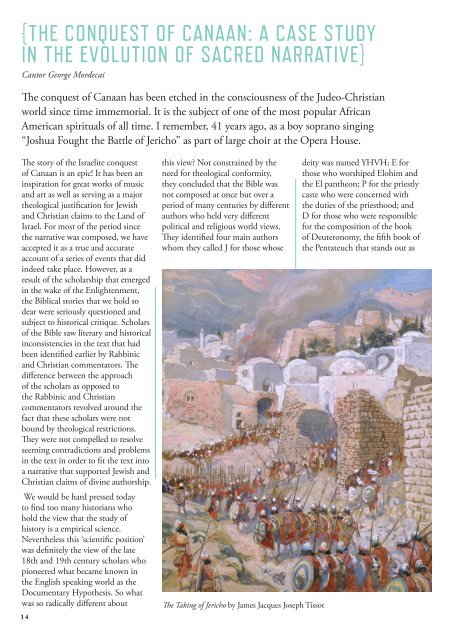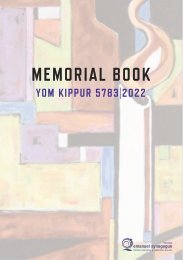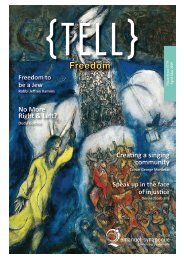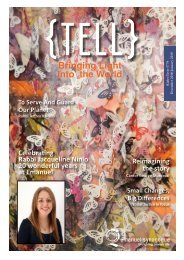You also want an ePaper? Increase the reach of your titles
YUMPU automatically turns print PDFs into web optimized ePapers that Google loves.
{THE CONQUEST OF CANAAN: A CASE STUDY<br />
IN THE EVOLUTION OF SACRED NARRATIVE}<br />
Cantor George Mordecai<br />
The conquest of Canaan has been etched in the consciousness of the Judeo-Christian<br />
world since time immemorial. It is the subject of one of the most popular African<br />
American spirituals of all time. I remember, 41 years ago, as a boy soprano singing<br />
“Joshua Fought the Battle of Jericho” as part of large choir at the Opera House.<br />
The story of the Israelite conquest<br />
of Canaan is an epic! It has been an<br />
inspiration for great works of music<br />
and art as well as serving as a major<br />
theological justification for Jewish<br />
and Christian claims to the Land of<br />
Israel. For most of the period since<br />
the narrative was composed, we have<br />
accepted it as a true and accurate<br />
account of a series of events that did<br />
indeed take place. However, as a<br />
result of the scholarship that emerged<br />
in the wake of the Enlightenment,<br />
the Biblical stories that we hold so<br />
dear were seriously questioned and<br />
subject to historical critique. Scholars<br />
of the Bible saw literary and historical<br />
inconsistencies in the text that had<br />
been identified earlier by Rabbinic<br />
and Christian commentators. The<br />
difference between the approach<br />
of the scholars as opposed to<br />
the Rabbinic and Christian<br />
commentators revolved around the<br />
fact that these scholars were not<br />
bound by theological restrictions.<br />
They were not compelled to resolve<br />
seeming contradictions and problems<br />
in the text in order to fit the text into<br />
a narrative that supported Jewish and<br />
Christian claims of divine authorship.<br />
We would be hard pressed today<br />
to find too many historians who<br />
hold the view that the study of<br />
history is a empirical science.<br />
Nevertheless this ‘scientific position’<br />
was definitely the view of the late<br />
18th and 19th century scholars who<br />
pioneered what became known in<br />
the English speaking world as the<br />
Documentary Hypothesis. So what<br />
was so radically different about<br />
14<br />
this view? Not constrained by the<br />
need for theological conformity,<br />
they concluded that the Bible was<br />
not composed at once but over a<br />
period of many centuries by different<br />
authors who held very different<br />
political and religious world views.<br />
They identified four main authors<br />
whom they called J for those whose<br />
The Taking of Jericho by James Jacques Joseph Tissot<br />
deity was named YHVH; E for<br />
those who worshiped Elohim and<br />
the El pantheon; P for the priestly<br />
caste who were concerned with<br />
the duties of the priesthood; and<br />
D for those who were responsible<br />
for the composition of the book<br />
of Deuteronomy, the fifth book of<br />
the Pentateuch that stands out as















